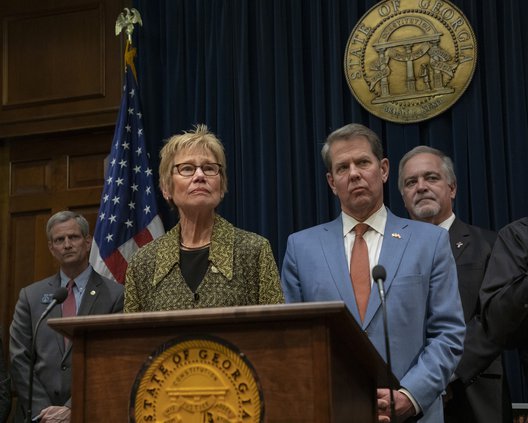COVINGTON, Ga. — The state of Georgia continued to ramp up its COVID-19 testing Tuesday, resulting in a gigantic increase in the number of confirmed cases by the time the Georgia Department of Public Health released its 7p.m. update.
Georgia now has 4,117 confirmed cases of COVID-19 as of Tuesday evening, a jump of 1,085 cases since the same time Monday.
The number of confirmed cases in Newton County rose to 31, an increase of nine since Monday’s 7p.m. update. There are no confirmed deaths from COVID-19 in Newton.
Gov. Brian Kemp announced Tuesday a large surge in the ability to test for COVID-19 in Georgia.
Kemp said there will be an increase in the availability of polymerase chain reaction testing, featuring pooled resources of the University System of Georgia, Georgia Public Health Laboratory and Emory University.
“Adequate testing for COVID-19 has continued to be a top priority for the Coronavirus Task Force as we fight this pandemic,” Kemp said.
“With this innovative partnership between state government agencies, our world-class research institutions and private-sector partners, we will be able to dramatically increase testing capacity.”
There are now 125 deaths in the state. Many had underlying health conditions, but five that died were not known to have underlying conditions and were all over the age of 50. The youngest person to die in the state was a 29-year old woman form Peach County. It is unknown if 41 of the 125 deaths, including the 29-year old form Peach County, had underlying health conditions.
The state has now reported to have conducted 16,181 tests with the majority of those being done at commercial labs. The Georgia Department of Public Health’s lab has tested just 1921 cases with 326 returning positive while the other 3,791 positive tests have come from the 14,260 tests completed by commercial labs.
In Georgia, the virus tends to be evenly distributed between males (46%) and females (51%) with 3% being unknown.
Many of the infected in the state are between the ages of 19-59, clocking in at 58% of confirmed cases. Those over the age of 60 account for just 35% of confirmed cases. 6% are unknown.
Nearly every county in the state now has at least one confirmed case. Only Union, Towns, Elbert, Taliaferro, Hancock, Putnam, Glascock, Crawford, Marion, Quitman, Treutlan, Montgomery, Telfair, Jeff Davis, Evans, Wayne, Brantley, Atkinson, Lanier and Echols counties are the only counties to not register confirmed cases.
Upon implementation new testing, labs will be able to process more than 3,000 samples per day.
“We hope this surge capacity plan will allow federal and state public health officials to gain a more complete picture of COVID-19’s impact on Georgia and better inform our collective decisions going forward,” Kemp said.
“We expect this plan will lead to greater testing capacity and more insight into the number of positive cases in our state.”
The partnership allows Georgia’s universities to transfer equipment needed for COVID-19 testing from their research labs to accredited clinical labs at Georgia State University, Augusta University, Emory University and the Georgia Public Health Laboratory.
Kemp’s office has expedited the purchase of necessary equipment and reagents to begin ramping up testing over the next five to seven days.
Dr. Kathleen E. Toomey, the state’s commissioner of public health, said the expansion of testing means identifying more cases, getting more people into care and protecting communities from the spread of the coronavirus.
“This collaboration will not only provide much needed capacity now, but it will ensure a robust state infrastructure for the future,” she said.
Kemp authorized a Laboratory Surge Capacity Task Force to validate new lab methods and implement new solutions and technologies to safeguard the state’s testing infrastructure. These efforts are designed to enable the four accredited labs to operate despite potential disruptions to the supply chain.




